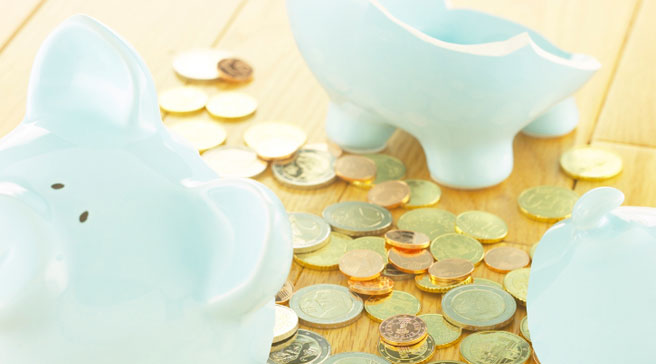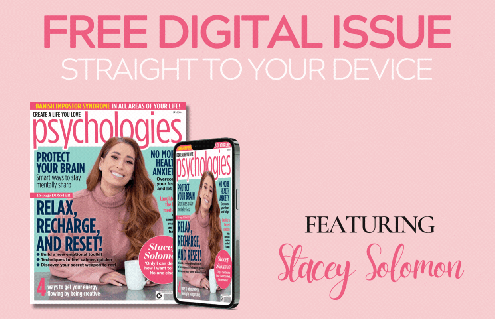Be positive in tough times
As news bulletins this morning warn of the shrinking UK economy and threats of a triple-dip recession, we may find ourselves with a renewed sense of uncertainty and worry. Living in unpredictable times can evoke feelings of anxiety, even fear. But not only is it possible to cope, we can thrive in hard times, says Hannah Borno

Polly, 36, was made redundant from her busy job in a publishing company, it felt as if the sky had fallen in. ‘My husband and I were petrified,' she says. 'Our first thought was that our children would have to go without and it was a period of great uncertainty and sleepless nights. But after a few months I found a little freelance work. Money is tight, but we’re coping, and seem to be spending a lot more time together. Six months ago, I would never have dreamed that we’d still be able to live an OK life like this. In fact, life is not just OK, but better than it’s been for years.’
Polly’s readjustment has been one of thousands of similar shifts across the UK. After years of buy-now-pay-later spending, we went into recession and no one’s sure what’s coming next. And this collapse in confidence is global. There is uncertainty in the collective unconscious at the moment.
'It is emotionally contagious,’ says Virginia Mallin. ‘However, it’s crucial to remember that even though these times feel unique to us, most of us have older family members who have lived through times like these before. They survived and, paradoxically, may even have thrived during difficult times — and we can, too.’
Yet thriving in uncertainty may seem an impossibility to many of us. The world that once felt so solid seems as unsteady as shifting sands beneath our feet. Media saturation is partly to blame for this, says Frank Furedi, professor of sociology at the University of Kent and author of Culture Of Fear Revisited. The news is full of emotive language — crunches, collapses, meltdowns and crashes — and we are overwhelming ourselves with it, he explains.
‘We find it very difficult to just have problems; problems immediately become crises of apocalyptic proportion. The oil running out is a crisis more dangerous than terrorism, child obesity is a “time bomb” that’s going to explode.’ Taking on these big fears is psychologically unhealthy. ‘They create an environment where we feel awkward and estranged by uncertainty, and that leads to risk-averse and conservative forms of behaviour,’ says Furedi. ‘We’ll engage in less experimentation, we don’t go outdoors so much, we don’t let our children engage with risk and uncertainty. We start to close down opportunities and look for guarantees.’
It’s only when we fully accept feelings of uncertainty that they’ll abate. ‘We can grow in confidence if we embrace uncertainty,’ says Dr Michael Sinclair, who specialises in redundancy and anxiety. ‘Running from uncertainty leaves us feeling even more unconfident and, therefore, more fearful. The more we try to accept it, no matter how unpleasant, the less we worry.’
Primal Fears
Yet while some of us may panic blindly in response to every hysterical headline, others seem to shrug off global worries. So what makes some individuals more vulnerable? ‘Those who are stuck in the infant mindset, in a “baby place”, are more prone to fear of uncertainty,' says Mallin. 'This is a certain kind of victim mentality. We think: “I am being buffeted around, with no power, and therefore I am helpless".' It’s the ultimate emotional regression. ‘When something big happens in our emotional environment it can throw us back to feeling childlike. We experience that same sense of abandonment a baby has when it realises the mother is a separate person who may go away and cannot be relied on: let down, abandoned and left to die. It’s that basic.’
And that primal fear is what many of us experience when we realise that we will not be taken care of anymore — that the social and economic structures, which we once believed were keeping us safe, providing the answers, a job and easy credit, are no longer reliable. This mindset is very powerful and what we feel often comes true.
‘If we believe the world is a terrible place and that we can’t cope, we’ll find fewer ways to make our lives better,’ says Mallin. So in an uncertain era, taking responsibility for ourselves and being prepared to take action is crucial. It’s a form of psychological growing up that is essential if we are ever to feel secure.
Over-estimating negative events
Although negative events can affect us, they don’t affect us as deeply, or for as long as we think they might. ‘We overestimate the intensity and duration of our distress in the face of future adversity,’ says Gilbert.
He goes on to explain that actual inescapable suffering triggers the processes that minimise it, while less intense suffering does not. ‘Failed marriages and lost jobs are the kinds of large-scale assaults on our happiness that trigger our psychological defences, but these defences are not triggered by broken pencils, stubbed toes or slow elevators. When experiences make us feel sufficiently unhappy the psychological immune system cooks facts and shifts blame in order to offer us a more positive view.’
In fact, says Gilbert, even the most catastrophic life changes will distress us less than we think. This is why chronically ill and disabled patients generally rate the value of their lives far more highly than we do when we imagine ourselves in their place. What can also be of comfort is that in an era of great uncertainty we don’t have to feel alone.
‘People tend to treat each other well and with great courtesy when they are frightened. If you look back at the most challenging moments in human history, widespread panic is not a common thread,’ says Amanda Ripley, a disaster expert and author of The Unthinkable: Who Survives When Disaster Strikes – And Why. These states of tension can prove incredibly productive.
‘Uncertainty is the “natural selection” element of the psyche,’ says Mallin. ‘The mind and soul need new challenges from outside our routine experiences, so fresh ways of thinking and adapting can be invented, grow and be tried out. Uncertainty allows doubt to plant the seeds of creative change, while a life without change is stagnant and unproductive. When we adapt and try new things, we expand our minds and hearts.’








